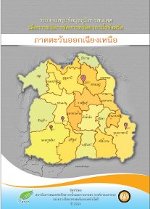| Impact of Climate Change Assessment on Agriculture Water Demand in Thailand |
|
Impact of Climate Change Assessment on Agriculture Water Demand in Thailand W. Chaowiwat*, S. Boonya-aroonnet, S. Weesakul Hydro Informatics Division, Hydro and Agro Informatics Institute, Bangkok, 10400 Thailand *Corresponding author: อีเมลนี้จะถูกป้องกันจากสแปมบอท แต่คุณต้องเปิดการใช้งานจาวาสคริปก่อน Abstract – In recent times, global climate change has induced extreme rainfall in terms of frequency, duration, pattern and intensity in many countries, including Thailand. Thailand has faced more flooding events and drought frequencies in the last few years, and is currently experiencing severe drought conditions and water shortages. The main consumers of water in Thailand is the agricultural sector, where climate change has caused damage to cultivated areas in both wet and dry seasons. Especially in 2015 and into 2016 Thailand has experienced drought phenomena. The Thai government has attempted to solve the drought problem by encouraging farmers to stop cultivating paddy rice in dry season and change the type of crop to less water consuming plants. It is therefore proving necessary to adapt water management policies and practices to ensure water demand side can be met on the water supply side, especially when the current water storage is limited, as in the current drought situation. The purpose of our study was to assess the impact of climate change on rainfall, temperature, and water demand in the main river basin in Thailand. The future climate model adopted in this study is focused on 7 general circulation model datasets with Representative Concentration Pathways (RCPs) 4.5 and 8.5 scenarios. The results show that the changing climate will result in about a 15% increase in water demand in both scenarios. The high risk water deficit areas include the Ping, Yom, Nan, Chi and Mun River Basins due to increasing water demand and decreasing rainfall. The Salween River Basin has the highest risk of a water deficit with the greatest increase in water demand of 32.6%. Keywords – climate change, water demand, general circulation model, statistical bias correction, evapotranspiration |
| แก้ไขล่าสุด ใน วันจันทร์ที่ 11 เมษายน 2016 เวลา 11:28 น. |





